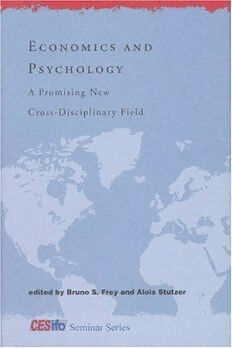
Economics and Psychology: A Promising New Cross-Disciplinary Field PDF
297 Pages·2007·2.441 MB·English
Most books are stored in the elastic cloud where traffic is expensive. For this reason, we have a limit on daily download.
Preview Economics and Psychology: A Promising New Cross-Disciplinary Field
Description:
The integration of economics and psychology has created a vibrant and fruitful emerging field of study. The essays in Economics and Psychology take a broad view of the interface between these two disciplines, going beyond the usual focus on ''behavioral economics.'' As documented in this volume, the influence of psychology on economics has been responsible for a view of human behavior that calls into question the assumption of complete rationality (and raises the possibility of altruistic acts), the acceptance of experiments as a valid method of economic research, and the idea that utility or well-being can be measured. The contributors, all leading researchers in the field, offer state-of-the-art discussions of such topics as pro-social behavior and the role of conditional cooperation and trust, happiness research as an empirical tool, the potential of neuroeconomics as a way to deepen understanding of individual decision making, and procedural utility as a concept that captures the well-being people derive directly from the processes and conditions leading to outcomes. Taken together, the essays in Economics and Psychology offer an assessment of where this new interdisciplinary field stands and what directions are most promising for future research, providing a useful guide for economists, psychologists, and social scientists.
See more
The list of books you might like
Most books are stored in the elastic cloud where traffic is expensive. For this reason, we have a limit on daily download.
